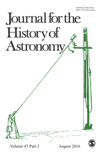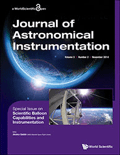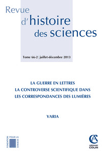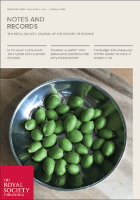
JOURNAL FOR THE HISTORY OF ASTRONOMY
Scope & Guideline
Unraveling the Tapestry of Astronomical Legacy
Introduction
Aims and Scopes
- Historical Analysis of Astronomical Practices:
The journal focuses on the historical methods and practices of astronomy, examining instruments, observations, and data interpretation from different time periods and cultures. - Interdisciplinary Approaches:
It encourages interdisciplinary research, integrating history, philosophy, cultural studies, and science, to provide a holistic understanding of how astronomical knowledge has evolved. - Cultural and Societal Impacts:
The journal explores the cultural and societal implications of astronomical discoveries and theories, including how they affected societal beliefs, practices, and knowledge systems. - Global Perspectives:
Research published often includes global perspectives, highlighting contributions from various cultures in the history of astronomy, including Islamic, Chinese, and European influences. - Analysis of Historical Texts and Manuscripts:
There is a strong emphasis on the analysis of historical texts and manuscripts related to astronomy, shedding light on the transmission of knowledge and the evolution of astronomical thought.
Trending and Emerging
- Impact of Modern Technology on Historical Astronomy:
There is an increasing interest in how modern technological advancements, such as digital imaging and data analysis, are applied to historical astronomical research, enhancing our understanding of past practices. - Cultural Astronomy:
A noticeable trend towards cultural astronomy is emerging, with studies exploring the intersections between astronomy and cultural practices, beliefs, and rituals across different societies. - Interdisciplinary Studies of Astronomy:
Research that employs interdisciplinary approaches, combining history, philosophy, and science, is becoming more prominent, as scholars seek to provide a richer context for understanding the development of astronomical knowledge. - Women in Astronomy:
There is a growing trend in exploring the contributions of women in the history of astronomy, highlighting their roles and impact in a historically male-dominated field. - Astronomical Observatories and Their Histories:
An increase in studies dedicated to the history and development of astronomical observatories reflects a trend toward understanding the institutional and infrastructural aspects of astronomy.
Declining or Waning
- Astrology and Its Historical Context:
Although astrology has historically been a significant area of study in relation to astronomy, recent publications show a decline in the focus on astrology as a legitimate field of inquiry, likely due to the increasing differentiation between astronomy and astrology. - Ancient Astronomical Methods:
There has been a noticeable decrease in studies solely focused on ancient astronomical methods, as the journal shifts towards more contemporary analyses and the integration of modern scientific perspectives. - Narrow Regional Studies:
Research that focuses exclusively on narrow regional studies, particularly those limited to specific local histories of astronomy, appears to be declining, with a trend toward broader, more comparative studies.
Similar Journals

Church History and Religious Culture
Exploring the Intersections of Faith and HistoryChurch History and Religious Culture is a reputable academic journal published by BRILL, focusing on the intricate interplay between history and religious practice. With an ISSN of 1871-241X and an E-ISSN of 1871-2428, this journal serves as a vital platform for scholars and students alike, fostering a deeper understanding of the multifaceted nature of religious traditions through a historical lens. Situated in the Netherlands, the journal is notable for its extensive chronological coverage, having begun its publication journey in 1912 and continuing to present impactful research well into 2024. While it currently holds a Q4 classification in both History and Religious Studies, its commitment to high-quality scholarship ensures relevance and engages a wide readership. Readers are invited to explore an array of research that not only reflects on past narratives but also contributes to contemporary discussions within the fields of history and religious studies, highlighting the enduring significance of faith and belief systems in human society.

Global Intellectual History
Connecting Cultures Through TimeGlobal Intellectual History is an esteemed journal published by Taylor & Francis Ltd, dedicated to exploring the intricate interconnections between global cultures, historical narratives, and intellectual thought from 2016 to 2024. With an ISSN of 2380-1883 and an E-ISSN of 2380-1891, this journal holds a Q2 category ranking in multiple fields, including Arts and Humanities, Cultural Studies, and History, indicating its reputable standing within the academic community. Although not openly accessible, it caters significantly to scholars and students interested in the multifaceted dimensions of intellectual history, offering critical insights and fresh perspectives that enhance our understanding of global narratives. With a Scopus ranking placing it in the upper percentiles across various categories, Global Intellectual History serves as an essential resource for advancing research and scholarly discourse in its field.

Journal of Astronomical Instrumentation
Empowering Astronomical Exploration through InnovationThe Journal of Astronomical Instrumentation, published by WORLD SCIENTIFIC PUBL CO PTE LTD, is a pioneering peer-reviewed journal that has established itself as a vital outlet for the dissemination of research in the fields of astronomy and astrophysics, as well as in instrumentation technologies. Since its inception in 2012, this international journal has provided a platform for researchers and practitioners to share their findings, innovations, and insights pertaining to astronomical tools and techniques. With an esteemed Q3 categorization in both Astronomy and Astrophysics and Instrumentation for 2023, it ranks within the top tier of journals in these disciplines, demonstrating its impact and relevance in the scholarly community. Covering a broad range of topics that encompass the design, development, and application of astronomical instruments, the journal also emphasizes technological advancements that enhance observational capabilities. Researchers, professionals, and students alike will find this journal an invaluable resource for staying abreast of current trends and breakthroughs in the field of astronomical instrumentation.

HISTORY OF SCIENCE
Connecting the Dots Between Science and Its Historical RootsHISTORY OF SCIENCE, published by SAGE PUBLICATIONS LTD, stands as a pivotal journal in the domain of historical studies, with a focus on the development and evolution of scientific thought and practice throughout history. With an ISSN of 0073-2753 and an E-ISSN of 1753-8564, this journal is recognized for its commitment to high-quality research, as evidenced by its categorization in the Q2 quartile for History and Q3 for History and Philosophy of Science in 2023. Spanning a converged history from 1962 to 2024, the journal serves as an essential platform for scholars, providing in-depth analyses and discussions that foster a deeper understanding of the interplay between science and its historical context. As a well-regarded source in the field, it ranks #140 out of 1760 in Arts and Humanities History and maintains a commendable 92nd percentile ranking, highlighting its influence and reach among researchers and professionals alike. Although not an Open Access journal, it remains accessible to students, scholars, and practitioners in the field, bridging the past and present of scientific inquiry.

History of Economic Thought and Policy
Bridging the Gap Between Theory and Practice in EconomicsHistory of Economic Thought and Policy is a vital journal published by FRANCO ANGELI, dedicated to exploring the intersections of economic theory, historical context, and public policy. With ISSN 2240-9971 and E-ISSN 2280-188X, this journal serves as an essential platform for scholars interested in the evolution of economic ideas and their implications for contemporary policy-making. Operating from Italy, it has established a comprehensive framework for interdisciplinary research in the fields of Economics and Econometrics, History, and Public Administration, although it currently holds a Q4 ranking in these categories according to 2023 metrics. The journal already encompasses multiple converging years from 2018 to 2024, underscoring its commitment to timely contributions to economic discourse. It aims to provide open access to its content, fostering a collaborative environment for researchers, professionals, and students keen on enhancing their understanding of economic thought throughout history. Despite its current challenges in Scopus rankings, with notable positions in arts, humanities, and social sciences, History of Economic Thought and Policy remains a promising outlet for significant and critical discussions surrounding the historical pathways that shape today’s economic policies.

Dynamis
Exploring the Intersections of History, Philosophy, and MedicineDynamis is a distinguished journal published by EDITORIAL UNIV GRANADA, focusing on the interdisciplinary fields of History and Philosophy of Science as well as Medicine. Since its inception in 1981, this journal has provided a platform for scholarly discussion and exploration of the evolution of scientific thought and medical practices, with a consistent commitment to enriching academic dialogue up to the year 2024. Operating within the Q4 category for both History and Philosophy of Science and Medicine in the 2023 rankings, it holds a unique niche despite its positioning and aims to amplify underrepresented voices and perspectives via rigorous academic analysis. Although not currently an open-access publication, Dynamis continues to serve as a vital resource for researchers, professionals, and students who are keen to understand the historical contexts and philosophical implications in these fields. Its impact within the academic community is reflected in its Scopus rankings, offering valuable insights into the interplay between history, philosophy, and medicine. Situated in beautiful Granada, Spain, Dynamis remains committed to fostering a deeper understanding of the sciences through a historical and philosophical lens.

Revue d Histoire des Sciences
Unraveling the Threads of Scientific Thought.Revue d'Histoire des Sciences is a distinguished academic journal published by Armand Colin, focusing on the intricate interplay of history and philosophy within the sciences. Since its inception in 1973, the journal has served as a vital platform for researchers, scholars, and students interested in exploring the historical dimensions of scientific development. With an ISSN of 0151-4105 and an E-ISSN of 1969-6582, this journal is recognized within the academic community, achieving a modest 2023 Scopus ranking of Q3 in History and Philosophy of Science, positioning it within the 41st percentile of its category. The journal offers a prestigious space for rigorous discourse, critical analysis, and innovative research aimed at advancing our understanding of the scientific enterprise's past. While it operates under a traditional access model, the ongoing commitment to rich scholarly content ensures that the contributions will resonate with those dedicated to the intersections of history, science, and philosophy, providing insights into how historical context shapes scientific inquiry and advancement.

Romanian Astronomical Journal
Exploring the depths of Astronomy and Astrophysics.Welcome to the Romanian Astronomical Journal, a distinguished publication operating under the esteemed EDITURA ACAD ROMANE, dedicated to advancing the field of Astronomy and Astrophysics. With a rich tradition rooted in Romania, this journal aims to foster scholarly discourse and disseminate pivotal research findings within the cosmic sciences. Although currently not designated as Open Access, the journal remains committed to ensuring that its content meets rigorous academic standards. The Romanian Astronomical Journal holds a commendable position in the academic community, achieving a Q3 ranking in Astronomy and Astrophysics and a Q4 ranking in Space and Planetary Science for 2023, reflecting its contribution to the scientific landscape. With a focus on originality and scholarly excellence, this journal serves as a vital resource for researchers, professionals, and students alike, promoting a deeper understanding of the universe and our place within it. Positioned at the intersection of innovative research and practical application, the Romanian Astronomical Journal invites contributions that push the boundaries of knowledge in our field.

Notes and Records-The Royal Society Journal of the History of Science
Uncovering the Past, Shaping the Future of ScienceNotes and Records - The Royal Society Journal of the History of Science is an esteemed scholarly journal published by the Royal Society in the United Kingdom, focusing on the historical aspects of science and its impact on modern scientific practices. With an ISSN of 0035-9149 and E-ISSN 1743-0178, this journal serves as a vital platform for researchers, professionals, and students who seek to explore the intricate connections between historical developments and contemporary scientific discourse. Recognized for its academic rigor, it holds a commendable position in the Q3 category of the History and Philosophy of Science field, ranking #56 out of 223 according to Scopus, and showcasing a 75th percentile ranking. Covering converged years from 1970 to 1973 and from 1975 to 2024, the journal publishes articles that contribute significantly to the understanding of the evolution of scientific thought. While it currently does not operate under an open access model, its esteemed content continues to engage a broad readership, fostering a deeper appreciation for the history behind scientific innovation and inquiry.

EXPERIMENTAL ASTRONOMY
Advancing Knowledge in Astronomy and BeyondEXPERIMENTAL ASTRONOMY, published by Springer, stands as a pivotal journal in the fields of Astronomy and Astrophysics as well as Space and Planetary Science. With an impressive Scopus ranking and a Q2 category as of 2023, the journal is recognized for its impactful contributions to experimental techniques and observations in astronomy. Covering a broad spectrum of topics from cosmic phenomena to planetary exploration, it serves as a vital platform for researchers, professionals, and students to disseminate and discuss innovative ideas and findings. The journal has evolved through various convergence years since its inception in 1989 and continues to thrive, fostering an environment for academic pursuit and collaboration. Though not an open-access journal, its rigorous peer-review process ensures high-quality publications that are essential for advancing the scientific community's understanding of the universe.